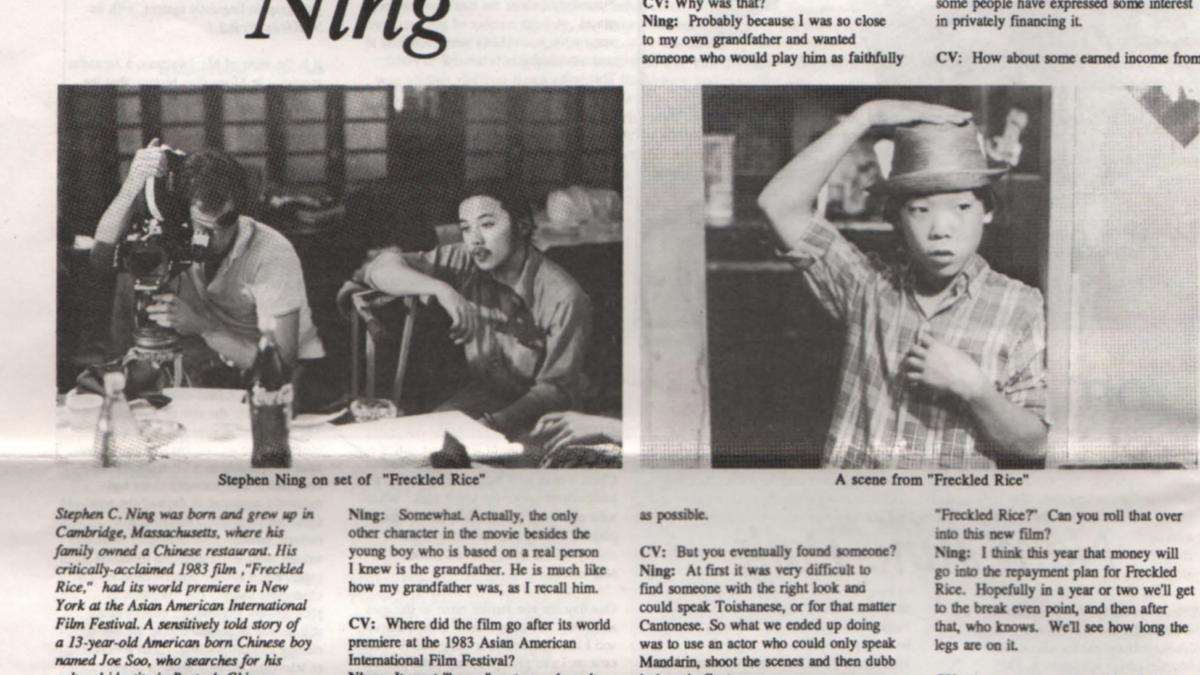Written by: Yuet-fung Ho
Editor’s Note: “Freckled Rice” originally screened at AAIFF83. It is an ACV Classic that re-screened at AAIFF45. Yuet-fung Ho produced the film alongside her husband, Steven C. Ning.
This postscript originally appeared in the AAIFF45 program book.
“Freckled Rice” was the first film I worked on in America, and it opened up a whole new world and exciting possibilities to me. I realized I could make a difference for myself and others by making films about Asian Americans.
I had arrived in New York a year earlier from Chicago, attracted by the energy of the city, searching for a new meaning of life while attending the MFA Program at Columbia University’s Film School. My background at the time was all commercial television. I had been a senior scriptwriter at the very popular terrestrial Hong Kong TV station TVB-HK, writing Cantonese scripts ranging from primetime episodic television dramas to limited series that had over 90% household shares.
Through life’s twists and turns, I landed on “Freckled Rice.”
Steve was very passionate about his storytelling and his cinematic vision. When I first got his script, it was all written in English. However, Steve wanted certain sections and scenes spoken in Toishanese or alternatively Cantonese, bearing in mind the hurdle of finding Toishanese speaking actors. I didn’t know his choice of doing multi Chinese dialects in an American narrative film was considered cutting edge and a vanguard approach at the time. I translated his selected sections in written Cantonese with Toishanese usage, to be delivered in Toishanese without much difficulty; and we all hoped to find the right actors. Of course, in the end we had to make all kinds of adjustments. J.P. Wing, who played the protagonist Joe Soo, had experience working on television shows in Boston while his buddy, Douglas Lee, was recommended by community organizer Don Kao. Others like Steve Chen, Arabella Hong, T.K. Liu, Michael G. Chin, Betty Fung, Phil Chew, Freddie Mao, plus other non-professional actors were a rare find in those pioneering days. And without hesitation, I took on the role of dialogue coach and assistant director.
We were very fortunate to be able to pull together a group of talented cast and crew members who were willing to work on a shoestring budget and long hours; we found some through Steve’s NYU contacts, some from his hometown in Cambridge/Boston, and through the support from New York’s Asian American community. We were able to shoot on locations without fees including a beautiful banquet hall of a popular Chinese restaurant in Boston Chinatown, to have delicious food subsidized by restaurant owners for the wedding banquet scene, to get restaurant managers and workers volunteer for any roles; to have family members and friends like his brother Richard Ning take on various roles, and to be fed by Steve’s mom Mary’s savory home cooking. Many people put in their best efforts to make it happen.
We actually had built a sound stage for the grandfather’s lodging quarter, thanks to our art director Andrea Collard and Steve’s vivid memory of his grandfather’s actual home. Steve was keen on his expression of colors, and worked closely with our cinematographer Paul Gibson and Andrea Collard to fill the screen with his vision. Others like Charlie Lew in sound, Li-shin Yu as AC for pulling sharp focus, Brooke Lyon in continuity, Ron Young as gaffer and Shu-lea Cheang in editing; they all were playing important roles to reach the high quality that Steve pursued. And many of them went on to impressive careers in their respective fields after this film.
“Freckled Rice” was not just a coming-of-age story of a young Chinese American. It was about cultural identity, immigrant history and perspective, community sensibility, family dynamics, and all the emotions that came along with them. It was an all-American story that many people could relate to.
“Freckled Rice” was just the starting line for us to create a greater number of Asian American roles on film. I was very impressed that Steve insisted on having the film’s world premiere at the 6th Asian American International Film Festival in 1983, instead of the usual holding-off to get other more mainstream film festivals to premiere the film first. He was proud to present his best efforts at “home” so as to support Asian American filmmaking in New York. The film did get awards and recognitions in well known international film festivals, and was broadcast on national and international television.
At the eve of Steve’s passing, he was in the casting stage of his second major film, a feature-length movie titled “The Spirit of Laundry,” a ghost story that took place in North Adams, MA.
As years go by, our community has grown not only in numbers, but in diversity, styles of expression, degrees of intensity, variety in personality dynamics; with all the vibrant colors and interesting Asian American characters that Steve envisioned would someday fill the movie screens.
Co-Producer/Assistant Director/Dialogue Coach
Freckled Rice
New York, hot summer of 2022

